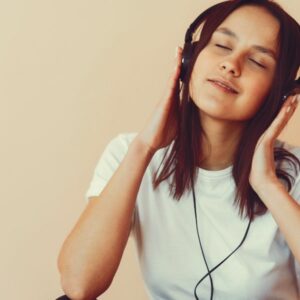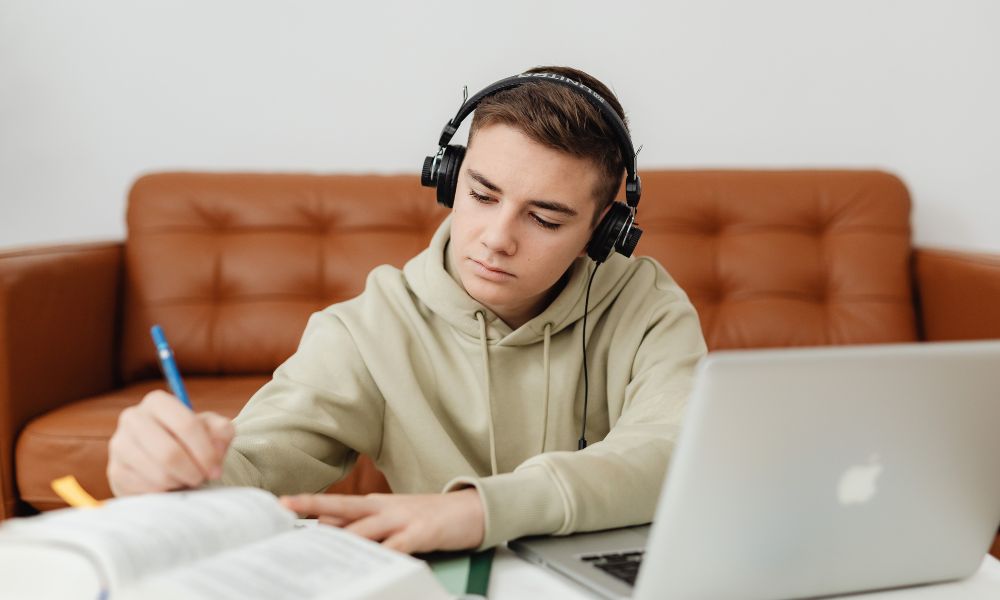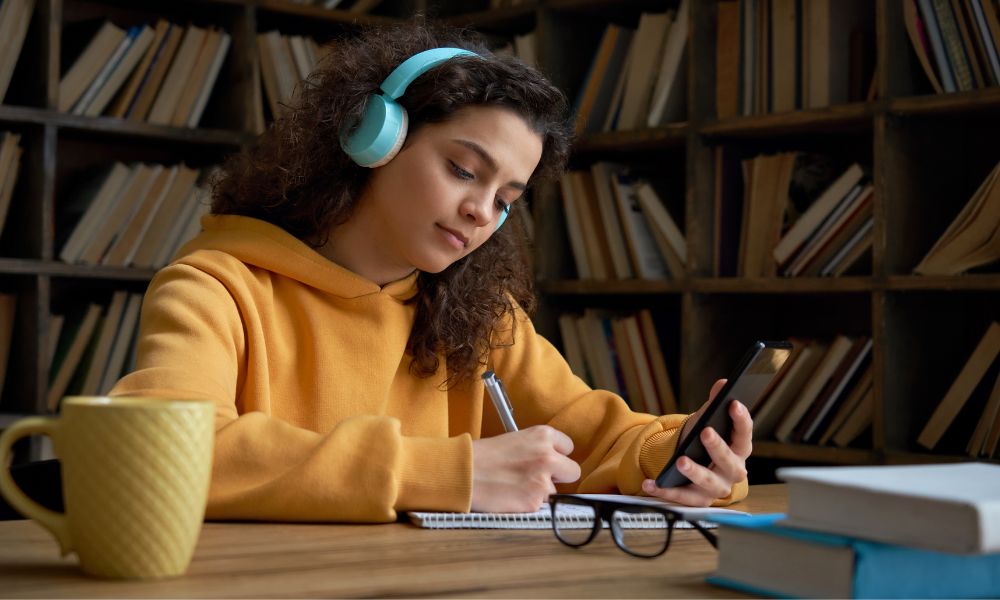
17 Apr 4 Types of Music That Help School kids and teens With ADHD Focus
4 TYPES OF MUSIC THAT HELP PEOPLE WITH ADHD FOCUS

How Do ADHD Brains Work?
ADHD (Attention Deficit Hyperactivity Disorder) is a neurodevelopmental disorder affecting millions worldwide. For students, ADHD can manifest in many ways. But there are a couple of common symptoms and effects.
While there is no single cause for ADHD, research suggests that genetic factors and environmental influences can lead to its development. Some common aspects of ADHD include the following:
- They have different brain structures and functions.
- Areas with impact involve executive functioning, attention, and impulse control.
- Struggles revolve around focusing on one task and controlling impulses.
- Attention can divert toward tasks and subjects that do not require immediate attention.
Note: Not everyone experiences the same symptoms or severity of ADHD. But overall, people diagnosed with ADHD find it difficult to focus on something deliberately.
How Does Music Help People with ADHD?
Music helps people with ADHD focus on relevant stimuli.
Emotional regulation is one of the biggest challenges for people with ADHD. Music with repetitive patterns and rhythms comes with no surprises. It can relieve stress and provide security to the listener because the composition becomes familiar.
1. Boost dopamine levels.
Dopamine is a neurotransmitter responsible for regulating pleasure, reward, and motivation. Listening to music releases dopamine in the brain’s reward center. Listening to our favorite tunes triggers the release of this feel-good hormone, making us feel happy and motivated.
2. It gives a sense of structure or routine.
People with ADHD can have problems with the structure. According to recent studies, incorporating music into a daily routine can help individuals with ADHD focus better, reduce stress levels, and improve overall mental health.
It helps regulate emotions, making a person less overwhelmed. In turn, this leads to less impulsive behavior and poor decision-making.
Music has a calming effect on the brain and helps regulate mood swings by reducing anxiety levels. It creates a sense of comfort and provides stability in an otherwise chaotic daily routine.
In addition, listening to music while completing tasks can help individuals with ADHD stay focused for longer periods.
3. It helps tap into selective attention.
Music can help tone down late selection stimuli. So, the listener can deliberately focus on what they want. Distraction and unnecessary stimuli step outside the radius of focus thanks to this phenomenon.

4. Enhances memory.
Studies have suggested that music stimulates different brain parts, including those involved in memory and learning. Listening to music before studying or doing homework helped children with ADHD to focus better and recall more information later.
5. Improves stress management skills and reduces anxiety.
Music can stimulate certain brain areas responsible for calming and reducing anxiety. One reason why music helps reduce stress in people with ADHD is that it distracts them from their symptoms.
When listening to music, individuals can focus on something other than their racing thoughts or hyperactivity, which can sometimes be overwhelming. Music’s soothing melodies and rhythms also calm the body by slowing down the heart rate and breathing, leading to relaxation.
6. Improves time awareness.
Individuals with ADHD struggle with focusing on a task. And due to that, they usually need to gain awareness of time. Music can help active brain areas that can regulate executive function and boost time awareness.
Compositions can act as cues for people with ADHD to manage their time between activities. These transitions also help you switch from one task to another without feeling overwhelmed.
7. Improves social skills.
People with ADHD can suffer from low self-esteem. Partly because they are unable to get things done on time, and that, in turn, creates feelings of dissatisfaction. So with the help of music, individuals can express themselves more easily as it creates a positive outlet for frustration.
What is the Theory of Selective Attention?
Achieving a balance between early-stage and late-stage attention is critical.
The load theory of selective attention is a prominent model in cognitive psychology that explains how individuals allocate their attentional resources during cognitive tasks.
According to this theory, the intensity of processing required for a task determines its attention level. This means that easy task processing needs less attention than difficult ones.
The theory proposes two types of attentional mechanisms: automatic and controlled processes. Automated processes are unconscious and require minimal effort, while controlled processes require conscious effort and consume more cognitive resources. Therefore, when a task is easy or requires low-level processing, it can be handled by automatic processes without consuming much mental energy.
However, when a task becomes complex and requires higher levels of processing or input from multiple sources simultaneously, it demands our limited cognitive resources. Controlled processes ensure optimal performance in such situations by allocating more attentional resources.

Early Stage Attention and Late Stage Attention
Early-stage attention refers to the initial processing of sensory input, while late-stage engagement involves more deliberate and controlled processing. It is sufficient to process all relevant information at low levels of perceptual load, such as reading a simple sentence.
However, late-stage attention becomes necessary to allocate additional resources for task completion at high levels of perceptual loads, such as trying to read multiple sentences simultaneously or in the presence of distracting stimuli.
Early-stage attention may become overwhelmed in these situations and fail to filter out irrelevant information.
What Types of Music can Improve Focus for People with ADHD?
Musical compositions can differ in frequency. More than that, choice in music is entirely subjective. However, some scientists have proposed theories to help people with ADHD choose compositions that benefit them.
- Avoid music that is too lyrical
- Go for music without interruptions (streaming with no ads)
- Music that sounds familiar but doesn’t get you humming
You may even find that your favorite track does not help you focus. Instead, white noise or an instrumental you aren’t used to may help you focus. Music apps these days have plenty of work and study playlists.
Below are the 4 types of music that help people with ADHD focus:
1. Rock
Rock music is characterized by its use of electric guitars, bass guitars, drums, and powerful vocals. The term “rock” was originally used to describe a combination of different styles, such as rhythm and blues, country music, folk music, and gospel.
- Reduces muscle tension in people with hyperactivity
- Good for people who also have hyperactivity along with attention deficit
- Rock music has repetitive beats
- It can help complete tasks
Rock music has evolved and now encompasses several sub-genres, such as classic, hard, punk, alternative, and many others.
2. Classical
Classical music has repetitive patterns. These rhythms can bring structure and order to the minds of people with ADHD. It achieves this by making the brain go into the alpha state.
- Produces a mild and soothing effect.
- Benefits speech, memory, and language
- Reduces stress levels and increases productivity
So overall, the slow tempo and lack of lyrics can make room for greater concentration. It also can activate different parts of the brain at the same time.

3. Lo-fi
Lo-fi, short for “low-fidelity,” is a genre of music that has been gaining popularity in recent years. It creates a unique sound by distorting the original recording.
- It may include tape hiss and ambient noise.
- Rhythm is stable and predictable (shares similarities with white noise)
- It reduces distractions by enhancing the focus abilities of the frontal brain lobe.
- Sharpens memory.
It results in a raw and unpolished sound characteristic of lo-fi music.
4. Binaural Beats
Binaural beats are sound wave therapy found to aid in relaxation and concentration. These beats present two different frequencies to each ear, creating a third frequency in the brain that can help promote focus and calmness.
- Combines to create a third frequency that boosts focus and calmness.
- Improves memory and attention span
- Provides clarity to the brain (which reduces impulses and distraction)
Additionally, binaural beats can also promote relaxation and reduce anxiety levels. Many individuals with ADHD struggle with hyperactivity and restlessness, making it difficult to relax or fall asleep at night.
This type of music is based on two different frequencies. A composition is called a binaural beat when music played in both ears has different frequencies.
Conclusion: Music Helps People With ADHD Focus
People with ADHD can boost their focus with music. Various genres can help with task completion, reducing muscle tension, synchronizing both sides of the brain, and more.
Remember, though, that ADHD comes in many forms. While music preference is subjective, it depends on whether hyperactivity is involved (or it is only ADD).
Nonetheless, music is a way of improving focus and balancing attention. It provides therapy to many parts of the brain, but never hesitate to contact a mental health professional if things need fixing.
Check Our Our Other Blogs:
Craig Selinger
Latest posts by Craig Selinger (see all)
- Psychotherapy and Support Services at Cope With School NYC - April 12, 2024
- NYC Parents of Teens Support Group - April 8, 2024
- Here I Am, I Am Me: An Illustrated Guide to Mental Health - April 4, 2024


No Comments